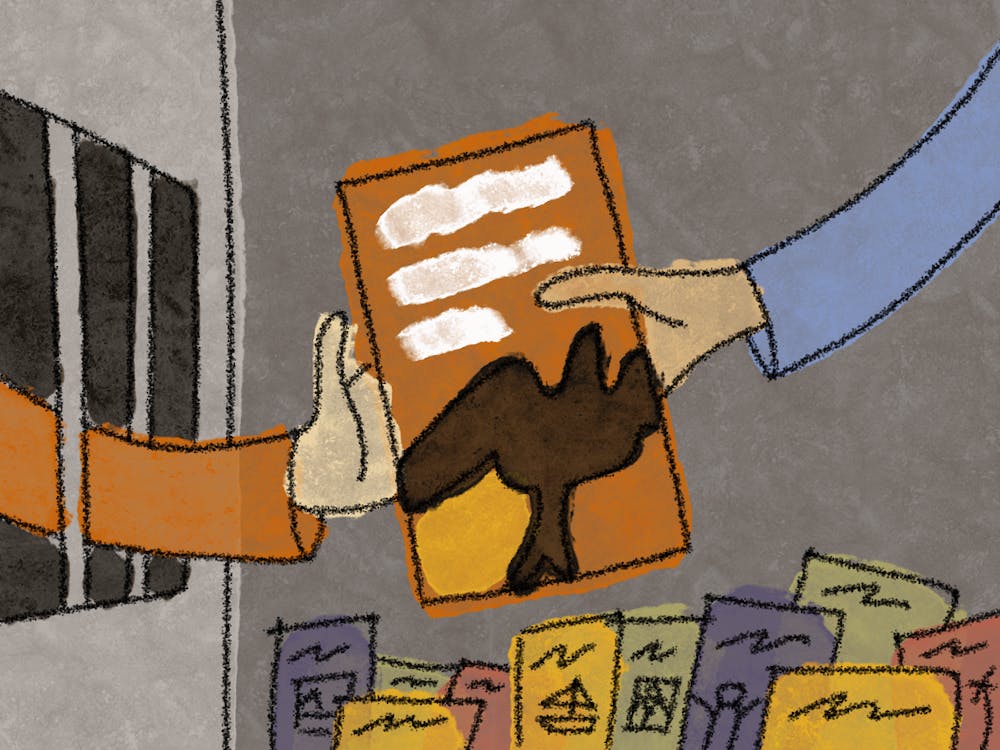Jojo Sacks scanned brightly colored book spines inside a makeshift library, searching for what books best fulfilled an order.
When nothing fit under Westerns, she moved to a shelf on the other side of the room. There, she found a book more fitting: a biography about Martin Luther King Jr. She wrapped the book in a pre-cut paper bag.
The package, labeled for postage, will be sent to a Florida prison.
Gainesville Books to Prisoners mails books to incarcerated individuals in prisons and jails across the state. Located inside the Civic Media Center, a small library is reserved for the project. Every other Tuesday, volunteers do their best to find books to fit inmates' requests.
Sacks, one of the project’s organizers, said its main goal is to promote media literacy.
“Free availability to read and learn, what we want to learn, is something people often leave incarcerated people out of the conversation,” Sacks said.
While book censorship in prisons is often justified due to safety or security concerns, U.S. prisons employ a variety of reasons why books are censored.
Independent nonprofits across Florida push for access to reading materials, which foster education, entertainment and personal growth during prison time.
History of book access
Florida holds some of the highest rates of K-12 book banning. It’s also one of the top states for prison book bans. More than 20,000 titles are banned in Florida prisons, according to the Marshall Project. Many restricted books are deemed too sexual or violent.
For insight into K-12 content restriction, Sacks said people should first look to prisons.
“There’s been censorship happening in prisons and jails and detention centers and other places of incarceration for a really long time,” she said.
The Marshall Project found more than 50,000 titles are prohibited in U.S. prisons, according to a 2023 report.
States that don’t maintain a banned book list evaluate them on a case-by-case basis, often with inconsistent rules and little oversight. Many book reviews happen at the hands of mailroom staff.
The Florida Department of Corrections lists specific rules for restricted books, noting material must lack descriptions of violence, sexual content or escape.
The process for inmates to request books begins with a letter written on a loose-leaf sheet of notebook paper. They can request specific genres, such as fantasy, science fiction and Western.
The organization sends three softcover copies per package with little to no stains or marks to minimize the chance of a book getting rejected. Books can’t have hard covers, metal binding or notes in their margins. Rules specify appearances to prevent substances or unapproved messages from reaching an inmate.
If a book is rejected, it’s returned to the sender. Sacks said the organization often receives books back without explanation.
Specific genres are in higher demand than others, she said, especially stories with high-speed pacing, including thrillers and adventure books. Reference books, including almanacs and dictionaries, and empty puzzle books like Sudoku and crosswords are also heavily requested.
Gainesville volunteers
Ashten Mays, a 35-year-old Gainesville resident, is another organizer for the project. The organization has evolved over many years, with the current version active since 2021, she said.
The organization began sending letters to prisoners before it started receiving book requests, she said.
“You get this huge stack of mail,” Mays said. “There’s a real need, a real desire [for the books].”
The organization wants the community to know that incarcerated people are also a part of Gainesville, she said.
“They’re just as much part of our community as anybody else, even though you can’t see them every day,” she said. “It’s [the project] a very easy way to bring people into this kind of work and highlight the importance of those people, even though they’re not here with us.”
The donation-based project has been struggling to fulfill “hundreds of requests a month” due to increasing postage prices. Postage rose from $5 to $7 per package after the United States Postal Service announced increased shipping rates effective July 2025, Mays said.
“We’ve been trying to get creative because funding has constantly been a problem for postage,” she said.
The organization primarily uses social media to attract donations but also applies for grants. It collaborates with local businesses, such as SquareHouse Pizza, which donates through its Round Up For Charity program.
Sam Edelweiss, a 29-year-old Gainesville resident, has volunteered for the project for two years. Sending books shows the project's solidarity with incarcerated people, they said.
Prison libraries are often in poor condition or closed, Edelweiss said, so it’s essential to send books. Inmates need books to learn about new topics or passions, they said.
“I’ve had people very dear to me affected by the police and prison system,” Edelweiss said.
Val Donaldson, a 25-year-old Gainesville resident, said the project is a way for her to “restore” prisoners' humanity, believing prisoners are “systemically getting that stripped from [them in] their day-to-day life.”
Depression rates among incarcerated people are higher due to loss of personal freedom and privacy, prison violence and social isolation. Just over 11% of inmates in 2024 had depression compared to about 7% of the general population.
Sending books is a “tangible and important” way to show inmates people outside prison care about them, Donaldson said.
Open Books
Gainesville Books to Prisoners isn’t the only organization of its kind in Florida. Open Books is a volunteer-run nonprofit bookstore open since 2000 in Pensacola.
Johnny Ardis, a 67-year-old Pensacola resident, is the bookstore’s general manager and has volunteered with the bookstore for 15 years.
The bookstore mailed over 4,500 packages in 2024, Ardis said, totaling over 13,500 books to inmates.
He said it’s vital to get books “into the hands of prisoners.” In addition to giving inmates something to look forward to, they lower recidivism rates, or the rate at which an incarcerated individual will commit another crime after being released.
“If they become educated while they are in prison, when they get out, they are more likely to get a job,” Ardis said.
A portion of the store’s proceeds go to the Pensacola Prison Book Project, which operates out of the bookstore, while also covering operating costs, such as rent and utilities.
The bookstore doesn’t have trouble with postage because a majority of the profits are allocated to its book-to-prisoners project, he said.
Looking ahead
Jojo Sacks said the most impactful part of the Gainesville Books to Prisoners project is receiving thank-you letters from inmates, which can be expensive to send.
“Folks going out of their way to use those materials to send us an unnecessary thank-you note is a really special thing,” Sacks said. “They didn’t have to do that.”
In her hand, she held a thank-you letter detailing gratitude for the project's contribution of books and a new pair of reading glasses.
“I should be enjoying the books even more!!” The note read. A glasses-wearing smiley face was drawn at the bottom.
Contact Alanna Robbert at arobbert@alligator.org. Follow her on X @alannafitzr.

Alanna is a journalism senior and the Fall 2025 data reporter for The Alligator's Enterprise desk. She was previously a general assignment reporter for metro. Outside of reporting, she is found either with a book, in the gym or with friends playing pool.






